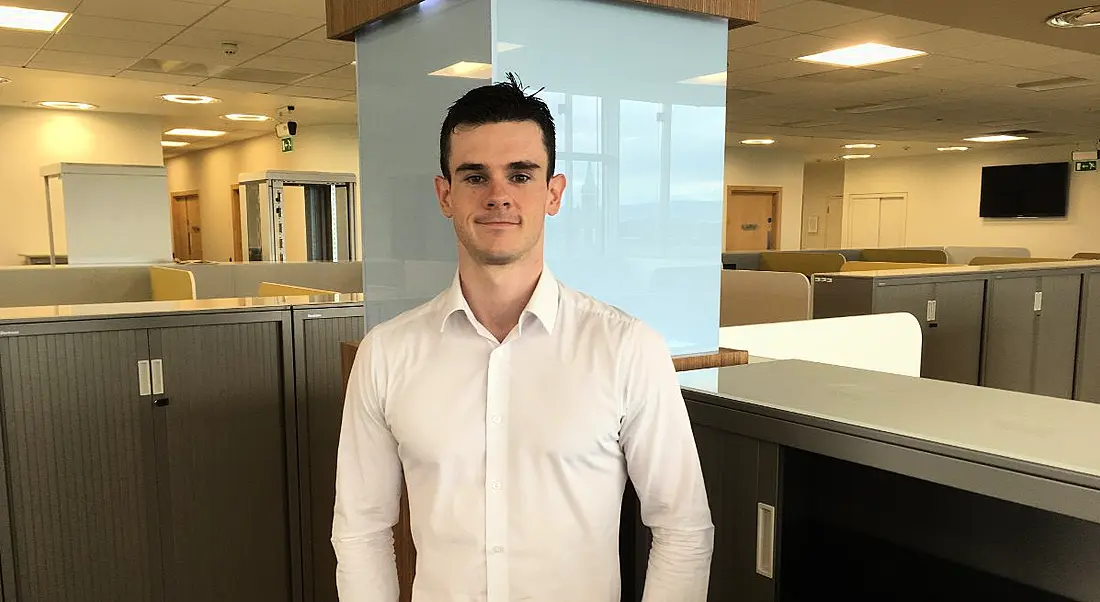With the right training and support, graduates can start working on their own projects before the end of their programme.
Graduate programmes are an excellent way to train new graduates and introduce them to the working world.
With proper support and mentoring, those who embark on their graduate programme can turn into fully fledged independent employees by the end, which this is why so many graduates enter these programmes every year.
Colin Walsh is a graduate on the cybersecurity consulting team at PwC. Here, he talks about his experience of the company’s graduate programme and how the training brought him on from supporting a manager to working on his own.
What did you study in college?
Computer science and business in Trinity College Dublin.
With this programme, are you now working in your desired industry?
Yes, I’m working in the cybersecurity consulting team in PwC.
What drew you to PwC when you were seeking work as a graduate?
During my final year, I saw that PwC were advertising a graduate programme on the college careers website. I had a cousin working in the company at the time so I decided to reach out to him for advice. We had coffee and he made it clear that PwC would be a great place to start my career as a graduate.
He explained that, given the nature of consulting, I would get the opportunity to work on a wide range of projects with different clients across various industries. Very few other companies offered that type of experience to graduates.
On top of that, PwC were well known for hiring top talent and delivering high-quality work, making it a great addition to any graduate’s CV.
What expectations did you have before you began the programme?
I wasn’t sure what to expect. I was initially worried that I wouldn’t be qualified enough for the work.
But the PwC onboarding programme was great in getting us ready for the job. This included a two-week cybersecurity training course in Orlando, Florida.
What duties and responsibilities were you given initially?
Initially, I was put on a data loss prevention project. I was asked to support a manager on a client site scanning data repositories to identify and deleting files no longer required by the company.
I was responsible for running the scanning tool, scheduling meetings with the client and preparing reports for the management team.
Did the scope of your work change as the programme progressed?
As the programme progressed, I got the opportunity to move onto other projects that were completely different.
I worked on projects involving security governance, operating model design, cybersecurity assessments and GDPR gap analyses.
Over time I was also given more responsibility. My role changed from supporting a manager to delivering work independently.
Can you describe a typical day in your role?
In consulting, it’s hard to define a typical day since the scope and type of work changes with each new client or project.
Typically, I would work closely with clients on cybersecurity projects, identifying problem areas and working collaboratively with them to implement solutions.
As well as that, any day you could be asked to help out with a proposal for a new piece of work, carry out research on a new technology or give a presentation.
How do your responsibilities compare to more experienced employees’?
As a consultant, my main responsibility is project delivery. The more experienced members on the team focus on managing project delivery and service improvement.
A lot of their work involves designing new solutions that we can bring to market such as threat and incident management and security architecture services.
Do you feel more prepared for working life after completing this programme?
Yes, the programme offered a combination of formal training and on-the-job learning which helped me develop both technical and management skills.
Every new project was a chance to upskill and learn something new. I definitely feel more confident now at being able to adapt to changes and challenges in my working life.
Why should someone apply to the graduate programme at PwC?
The PwC graduate programme will give new graduates a level of experience that few companies can offer, with the opportunity to work on a wide range of projects in a number of different industries.
In PwC, there’s also a great focus on learning and development, as well as a huge number of very intelligent professionals who can teach you a lot.
Outside of work, PwC offer a good work-life balance with flexibility, early Friday finishes during the summer and lots of social events planned throughout the year.
I would recommend PwC as a great place to start for any a graduate interested in technology or cybersecurity.




